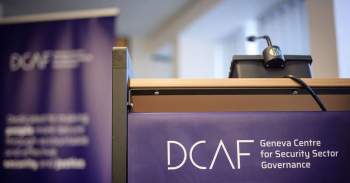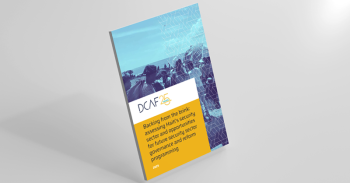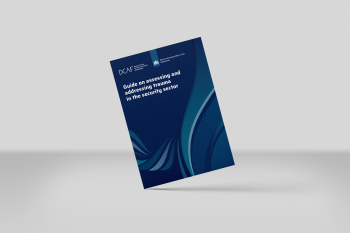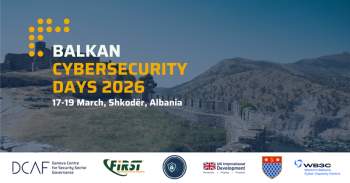Latest
News
DCAF's security sector governance assessment for Haiti Check out our public summary of DCAF's security sector governance assessment for Haiti. It provides 17 concrete recommendations targeting the security sector and the broader national security ecosystem. A key conclusion is that international support must bridge short-term tactical aid with medium-term institutional reform. Lasting solutions need to address crisis roots: jobs, justice, and ending impunity.Therefore, investments must build both operational capacity and governance foundations—focusing on leadership, accountability, and integrity. 18 Feb 2026
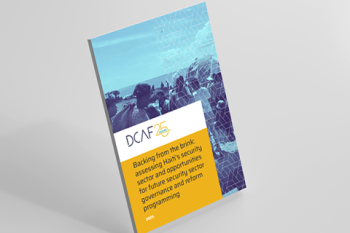
DCAF's security sector governance assessment for Haiti
Check out our public summary of DCAF's security sector governance assessment for Haiti. It provides 17 concrete recommendations targeting the security sector and the broader national security ecosystem. A key conclusion is that international support must bridge short-term tactical aid with medium-term institutional reform. Lasting solutions need to address crisis roots: jobs, justice, and ending impunity.Therefore, investments must build both operational capacity and governance foundations—focusing on leadership, accountability, and integrity.
18 Feb 2026
DCAF is participating in the 2026 Munich Security Conference As one of the world’s leading forums on international security policy, the Munich Security Conference unites experts and decision-makers to discuss today's most critical security issues, including the future of European security. We are pleased to participate in these important discussions through three high-level roundtables: one on the situation in Syria, one on women in defense and the WPS agenda, and one on human security. Stay tuned on our social media to see the highlights from these events. See also Why defence build-up fails without governance, by Nathalie Chuard, Director of DCAF, and Francesca Grandi, Director of Transparency International's Global Defense and Security Program. 13 Feb 2026
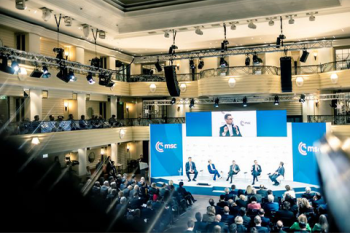
DCAF is participating in the 2026 Munich Security Conference
As one of the world’s leading forums on international security policy, the Munich Security Conference unites experts and decision-makers to discuss today's most critical security issues, including the future of European security. We are pleased to participate in these important discussions through three high-level roundtables: one on the situation in Syria, one on women in defense and the WPS agenda, and one on human security. Stay tuned on our social media to see the highlights from these events. See also Why defence build-up fails without governance, by Nathalie Chuard, Director of DCAF, and Francesca Grandi, Director of Transparency International's Global Defense and Security Program.
13 Feb 2026
Study visit of a high-level Armenian delegation at DCAF DCAF hosted a high-level Armenian delegation at the Maison de la Paix in Geneva for an in-depth study visit on security sector governance. Held under the Chatham House Rule, the programme provided a neutral and confidential setting for government and parliamentary decision-makers to engage, build shared understanding, and align on priorities for Armenia’s reform journey. The study visit served as a comprehensive knowledge-transfer platform, bridging Armenian strategic priorities with international good practices. 09 Feb 2026
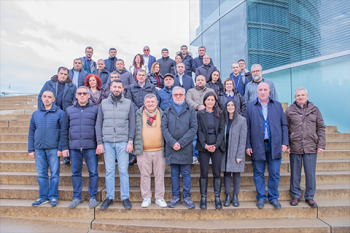
Study visit of a high-level Armenian delegation at DCAF
DCAF hosted a high-level Armenian delegation at the Maison de la Paix in Geneva for an in-depth study visit on security sector governance. Held under the Chatham House Rule, the programme provided a neutral and confidential setting for government and parliamentary decision-makers to engage, build shared understanding, and align on priorities for Armenia’s reform journey. The study visit served as a comprehensive knowledge-transfer platform, bridging Armenian strategic priorities with international good practices.
09 Feb 2026
DCAF's new podcast Shaping Security is now available! What role does the media play in covering issues related to the security sector? And why does responsible coverage matter more than ever in today’s information landscape? In our first episode, Jackie Dalton, Head of Editorial Content at Fondation Hirondelle, discusses what it means to be a journalist covering the security sector and the variety of challenges they face on the ground. Listen to the first episode now and let us know your thoughts. 06 Feb 2026

DCAF's new podcast Shaping Security is now available!
What role does the media play in covering issues related to the security sector? And why does responsible coverage matter more than ever in today’s information landscape?
06 Feb 2026
In our first episode, Jackie Dalton, Head of Editorial Content at Fondation Hirondelle, discusses what it means to be a journalist covering the security sector and the variety of challenges they face on the ground. Listen to the first episode now and let us know your thoughts.
North Macedonia’s NATO journey documentary What does it mean to join NATO — and how does it change a country’s security future? Our latest video documentary takes a closer look at North Macedonia’s NATO journey, highlighting the challenges the country faced prior to accession, the security and defence reforms it undertook, and how NATO membership has reshaped the national security landscape. Take a look! 05 Feb 2026
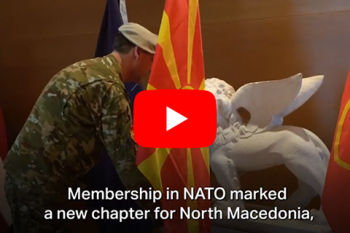
North Macedonia’s NATO journey documentary
What does it mean to join NATO — and how does it change a country’s security future?
05 Feb 2026
Our latest video documentary takes a closer look at North Macedonia’s NATO journey, highlighting the challenges the country faced prior to accession, the security and defence reforms it undertook, and how NATO membership has reshaped the national security landscape. Take a look!
Latest
article After Munich: Making Security Investments Today Without Creating Tomorrow’s Vulnerabilities 19 Feb 2026
opinion Why defence build-up fails without governance 14 Feb 2026
Publications Toolkit for defence ethics: From principles to practice 13 Feb 2026
Publications More than a mandate? Making gender training in security institutions matter 12 Feb 2026
- Publications
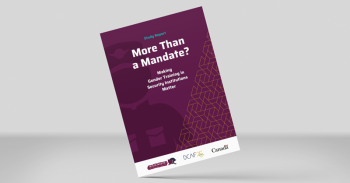
More than a mandate? Making gender training in security institutions matter
12 Feb 2026
Publications Backing from the brink: Assessing Haiti’s security sector and opportunities for future SSG/R programming 11 Feb 2026
Publications Intelligence oversight in the Euro-Atlantic area: Extending to law enforcement functions 09 Feb 2026
- Publications

Intelligence oversight in the Euro-Atlantic area: Extending to law enforcement functions
09 Feb 2026
Publications Guide on assessing and addressing trauma in the security sector 03 Feb 2026
Multimedia Mini-documentaries series: Intelligence and Security Sector Reforms in North Macedonia 02 Feb 2026
- Multimedia
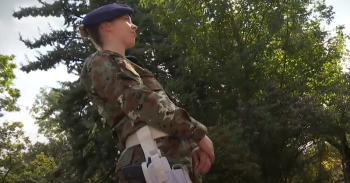
Mini-documentaries series: Intelligence and Security Sector Reforms in North Macedonia
02 Feb 2026
Event Balkans Cybersecurity Days 2026 22 Dec 2025
Most popular
Publications
Teaching gender in the military: A handbook
17 Nov 2025
Teaching gender in the military: A handbook
17 Nov 2025- Publications
Teaching gender in the military: A handbook
17 Nov 2025 - Event
Words into action: The future of security sector governance
07 Oct 2025 - Event
DCAF Young Faces 2025-2026
25 Sep 2025 - Publications
Guide on assessing and addressing trauma in the security sector
03 Feb 2026 - Publications
More than a mandate? Making gender training in security institutions matter
12 Feb 2026 - Event
Balkans Cybersecurity Days 2026
22 Dec 2025 - Publications
Quick reference guide: Entry points for addressing trauma in police reform programmes
27 Oct 2025 - Publications
Harvesting the fruits of gender work
07 Nov 2025 - Publications
Mentoring in the Police Environment
02 Oct 2025

